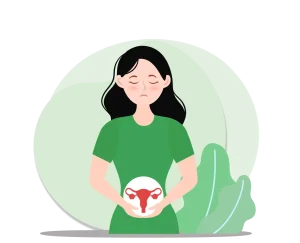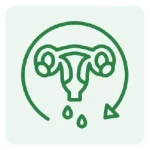Poly-Cystic Ovarian Disease (PCOD)
Prevention. Wellness. Treatment.


A woman’s body contains a small level of male hormones known as androgens. In women with PCOS, the levels of male hormones increase, preventing the ovaries from producing eggs during the monthly menstrual cycle.

High levels of insulin
Insulin resistance, which may result from unhealthy lifestyle and eating habits, causes type 2 diabetes that leads to obesity. It also leads to high levels of insulin that interrupt the functions of other hormones and physiologies, leading to PCOS.
Signs and Symptoms of PCOD





According to Ayurveda, PCOS is primarily caused by an imbalance in the Kapha and Vata doshas. This imbalance disrupts the functioning of the reproductive system, leading to hormonal irregularities. Ayurveda emphasizes the need for holistic healing to restore the balance of these doshas and alleviate PCOS symptoms
Signs and Symptoms of PCOD

Ayurvedic Treatment for PCOD
The management depends on the presenting symptoms and may include the following:
- Detoxification: A right way to begin the treatment. Women who undergo cleansing show remarkable changes in the condition of the ovaries and improvement in metabolic function, depression, hair fall, etc.
- Weight loss in PCOS: Excess adipose tissue in obese patients creates the paradox of having excess androgen and oestrogen, which can contribute to PCOS symptoms. Losing even just 5% of body weight can help bring hormones into balance and regulate menstrual cycles. Aadhiayurveda Ayurveda employs a combination of personalised diet plans, exercise, and Ayurvedic medicines to promote weight loss and maintain a healthy weight.

Ayurvedic Medicines for PCOD
Ayurveda experts for PCOS at Aadhiayurveda Treat PCOS strategically with 90-150 days of medicines which can rectify symptoms like absent /scanty menstruation with medicines like MENSOFLOW KASKAYA , CP MAP , AV MAP, NOVACALM , SAPTASARA KASHAYAM, RAJAPRAVARTHINI VATI etc. There are various Ayurvedic herbal medicines and formulations to address PCOS symptoms.
- Shatavari: Helps regulate ovulation and hormone production.
- Triphala: Assists in detoxification and improves digestion.
- Guggul: Reduces cholesterol levels and aids in weight management.

Yoga for PCOD
Stress is a significant factor that contributes to PCOS symptoms. Specific yoga poses like Dhanurasana (Bow Pose), Bhujangasana (Cobra Pose), and Paschimottanasana (Seated Forward Bend) help regulate hormonal function, improve blood circulation, and reduce stress.
At Aadhiayurveda Ayurveda, our yoga experts assist women with PCOS with various yoga asanas that enhance the body’s ability to reduce the severity of the disease.

